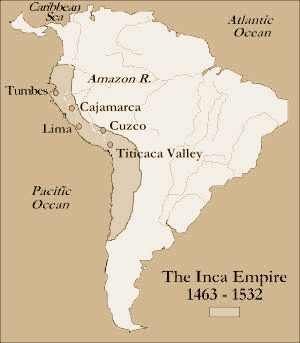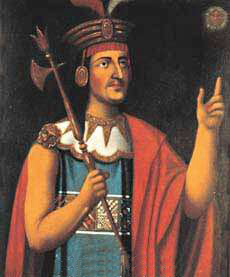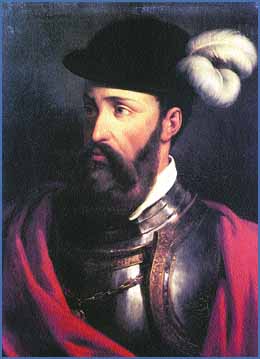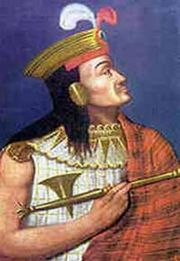
The Conquest of the Inca Empire

Little did the residents of the massive Inca empire know that they would soon be learning Spanish in Peru. Their adoption of the rapidly-spreading Spanish language would be symptomatic of the loss of their culture and land (one of the richest in America) at the hands of the Spanish invaders.
For the conquistadors it was difficult to realise what they were encountering, partly because they were remarkably ignorant and dismissive of any pre-existing South American culture. But the Inca Empire was also in a bad state.
A Divided Peru
By the 16th century, the man responsible for this great empire was Huayna Capac - a a fair ruler who had several sons all vying to rule the empire alone. The legitimate prince, Túpac Cusi Hualpa (Huáscar), had been raised as the successor. Atahualpa was an illegitimate son, but he had the same aspirations as Huáscar. Once their father died, the two immersed the Empire in a civil war.

Huáscar might have had the legitimacy but Atahualpa had the charisma and an army to match. Although Huáscar proclaimed himself ruler of the empire, he had little following to support his claim. He remained in the capital while Atahualpa proceeded to conquer territories in the North and South.
Since the whole dispute was between Huáscar’s mercenaries and Atahualpa's professional soldiers, the dice were loaded against Huáscar. Soon Atahualpa's troops ran out of territories to conquer and set off for Cuzco. The battle raged for two days before finishing with Atahualpa's crushing victory.
Atahualpa himself didn't hear of this until a few days later. He was hiding out in royal resort springs of Cajamarca when his messenger broke the news. And he also mentioned seeing some weird-looking men coming to their town.
The conquistadors had arrived in Peru.
Conquest of Peru

Francisco Pizarro was born a poor man in Extremadura. Which in 1470s Spain pretty much amounts to the middle of nowhere. When he heard about a land brimming with gold and riches up for grabs, he obviously found a new meaning to life. Of all the things there is to know about Peru, which then were not many, he decided to stick to that. He went there several times until he got permission from the Queen to carry out the conquest of Peru and become its Governor, in 1532.
However, his presence in the Empire had already brought it to a near-halt. The civil war was raging and the diseasesPizarro himself had brought with him from the Old World were wreaking havoc among the population. If he wanted to do away with all of Peru's population, his job was already half done.
In any case, he wanted to meet with Atahualpa. He sent his captain, Hernando de Soto, to meet with him on a horse. Atahualpa had never seen one before and was clearly surprised and impressed. He listened to De Soto's prepared speech and agreed to see Pizarro in person the following day in Cajamarca.
The meeting at Cajamarca turned into a massacre. Pizarro had his 168 men strategically hidden in corners (62 of them on horseback) and tried to convince Atahualpa to convert to the "one true religion", Catholicism. He offered the Inca a Bible, claiming it had all the answers.

Atahualpa had never seen a book, so he put it next to his ear and waited for it for to give him the promised answers. When it didn’t, he threw the Bible to the ground, exasperated. This was either perceived as an offence or as an excuse to start the attack.
In any case, Pizarro's used their advance weaponry to kill 2,000 men that day and abducting Atahualpa.
As a ransom, Atahualpa offered Pizarro what he knew he would like best -- tons of gold and even more silver. Pizarro gladly accepted the offer but never released Atahualpa. In his confinement, Atahualpa began to fear Huáscar would strike back, so he ordered to have him killed. The Spaniards had similar concerns with him, and took a similar approach: after converting him to Christianity (and baptizing him as Francisco in one of those displays of irony history is so fond of), he was garrotted and killed.
Spanish troops then proceeded to murder whatever their diseases had left of the Inca Empire population. They extinguished their culture, destroyed most of their cities to build new ones with new names (Pizarro himself created the now-capital, Lima) which paved the way for thousands of their citizens to move there.
The effect was devastating to the Incas. Spain became a much richer and prominent country, but rich Peru was looted and left empty. The conquest of Peru was the first of many in the Americas.
